The 33rd Berlin School on Neutron Scattering will be held from 28th February to 8th March 2013, at the Helmholtz Zentrum Berlin in Germany.
The school program consists of three days of lectures giving a theoretical introduction to the fundamentals of neutron scattering and the principles of various neutron scattering techniques. After the lectures, there will be three and a half days of hands-on experiments on seven different neutron scattering instruments. The students will be divided into groups of four to five people from similar subject areas and will do triple-axis spectroscopy, powder diffraction, small angle scattering, reflectometry, time-of-flight spectroscopy, tomography and residual stress analysis under the guidance of experienced
scientists. The school will finish with lectures on how to use neutron scattering as a tool for research in the areas of biology, chemistry, engineering and physics.
This course is part of the curriculum of the Faculty of Mathematics and Sciences at the Technical University Berlin.
For further details please visit our website
http://www.helmholtz-berlin.de/events/neutronschool/index_de.html
Closing date for application: 31. Oktober 2012
The Berlin Neutron School is one of the oldest established neutron schools. It was founded in 1980 by Prof Hans Dachs and is organised by the Helmholtz Zentrum Berlin für Materialien und Energie (HZB). The aim of the school is to provide an introduction to neutron scattering with an emphasis on hands-on, practical experience using the instruments at the BERII reactor.
The first three days of the school consist of detailed lectures on the principles and techniques of neutron scattering followed by a tour of the instruments and an introduction to sample environment. As well as the course lectures given by members of HZB, guest lecturers are invited to review current issues in the field of neutron research. For example, Prof Michael Steiner (ENSA) regularly comes to discuss the future of neutron sources in Europe and Dr Andrea Denker (HZB) has lectured on neutron auto-radiography and how this can be used to learn more about paintings and artifacts. After attending the lectures the students begin the hands-on experiments. They are divided into groups of four to five people from similar subject areas and do triple-axis spectroscopy, powder diffraction, small angle scattering, reflectometry, time-of-flight spectroscopy, tomography and residual stress analysis under the guidance of the instrument scientists. The experiments last three hours each and take place over three and a half days. On the last day of the school the students attend lectures on how to use neutron scattering as a tool for research in the areas of biology, chemistry, engineering and physics.
This school is primarily aimed at advanced students who have completed their undergraduate studies or Vordiplom in physical, engineering and life sciences, and early stage researchers e.g. PhD students and postdocs. The course is part of the curriculum of the Faculty of Mathematics and Sciences at the Technical University Berlin.

